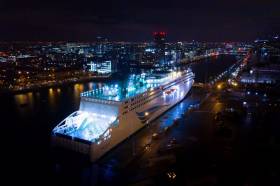Displaying items by tag: Enters Service JAN 2019
W.B. Yeats Maiden Commercial Sailing Scheduled A Month After Christmas But On Dublin-Holyhead Route
#FerryNews - According to the Irish Ferries website, online bookings for W.B. Yeats, indicate that the brand new €144m luxury cruiseferry is to enter service a month after Christmas Day, but firstly on the Dublin-Holyhead route, writes Jehan Ashmore.
Afloat has identified that the maiden commercial crossing of W.B. Yeats, the 1,800 passenger/1,200 vehicles, is to take place between Ireland and Wales next year, with a sailing scheduled on 25 January.
The timing for the maiden crossing, was echoed on the ferry's facebook page in regards to a query, if the new ship will be open to the public in advance of service, however Irish Ferries responded that there will be no public open days but that sailings on the Dublin-Holyhead route from January will be available.
The 54,000 gross tonnage newbuild currently docked next to Dublin's East-Link bridge, was to have orginally entered on the route to Wales in September, following the debut of the W.B. Yeats on the Dublin-Cherbourg route this summer. As well documentated at this stage, delays caused by contractors supplying the German shipyard prevented such plans.
Irish Ferries recenty revealed a revised date to launch W.B. Yeats on the Dublin-Cherbourg route that is to begin in mid-March, though the operator this week accounced Rosslare-based routes to French ports of Cherbourg and Roscoff are unlikely to resume in 2019.
The decision to withdrew the direct routes to mainland Europe, drew widespread critism from the public, the haulage sector and policitians alike. Irish Ferries however stated that they will continue to keep this situation under review.
In the meantime in the run up to the busy festive period, Irish Ferries have both Ulysses and Oscar Wilde maintaining services on the Dublin-Holyhead route.
The chartered in ropax Epsilon, will continue operating on the year-round operated Dublin-Cherbourg route. It is still possible to sail from Rosslare-Cherbourg before the year ends, given Wexford based sailings to France ceased in recent months. For example Afloat has also identified a sailing from Rosslare to Cherbourg on 29 December.
On the Rosslare-Pembroke route, Isle of Inishmore will operate too up to the festive period on the route linking south Wales.
As usual there will be no sailings operated during Christmas Day and St. Stephen's Day.
Also according to the operator's booking site, Ulysses is to take a final crossing from Dublin to Holyhead on 6 January, this would suggest an off-service period for routine dry-docking.
During the months of January and February, been the quietest time, it is routine for ferry operators to dry-dock ferries for annual dry-docking maintenance.
For the latest information on all routes, sailings and updates, it is advisable to consult the operator's website here.






























































